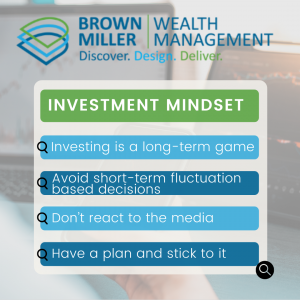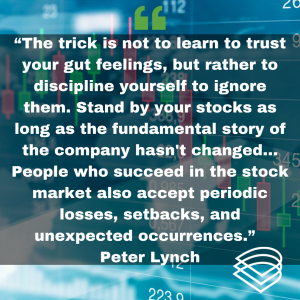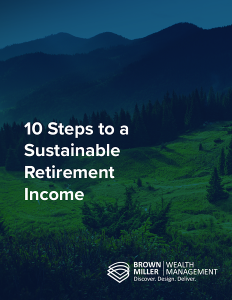
It’s a quirk of the human psyche that we base our expectations on how things have been, although we know change is constant. When the economy is strong and growing, this expectation can work in our favor. Yet during market volatility or uncertainty, it can increase the likelihood of rash and regrettable decisions.
The good news is that every economic condition presents investment opportunities. The economy’s cyclical nature also means an expansion eventually follows a contraction. The key to navigating a changing economy is calm, clear-headed decision-making informed by market data.
Chapter 1
The Crucial Importance of Your Investment Mindset
Chapter 2
What is Causing Inflation?
Chapter 3
6 Investments to Help Protect Yourself From Inflation
Chapter 4
What is Volatility in the Market?
Chapter 5
Short-Term Investing in a Volatile Market
Chapter 6
Long-Term Investing in a Volatile Market
Chapter 7
In a Changing Economy, Stay Alert for Opportunity
Chapter 1
The Crucial Importance of Your Investment Mindset
Researchers have discovered that  up to 95% of purchasing decisions are based on emotions, which may be okay when choosing a new pair of shoes, but can be significantly harmful in investing. Not even happiness is as good of a guide as systematic analysis. As an investor, maintain the right mindset with these tips:
up to 95% of purchasing decisions are based on emotions, which may be okay when choosing a new pair of shoes, but can be significantly harmful in investing. Not even happiness is as good of a guide as systematic analysis. As an investor, maintain the right mindset with these tips:
- Know that investing is a long-term game
- Avoid decisions based on short-term fluctuations
- Don’t react to the media
- Have a plan and stick to it
Whether working with a financial planner in Washington D.C. or investing independently, make adjustments strategically with the big picture in mind. This approach requires patience.
You set yourself up for success when you remain confident in your abilities, make calculated decisions after calm analysis, and stay focused on your goals.
Chapter 2
What is Causing Inflation?
Inflation is when the costs of goods and services rise across multiple industries and sectors, causing the buying power of each dollar to go down. Since the economy is driven by supply, demand, and fiscal policy, these are the primary forces contributing to inflation.
The coronavirus caused some factories to shut down or reduce production on the supply side. There have been interruptions and slow-downs in the supply chain for everything from car parts to cat food.
On the demand side, months of lockdown and repeated stimulus checks resulted in extra savings and pent-up demand for some consumers. People are shopping and traveling even as prices rise.
These forces alone may naturally balance as businesses reopen, fiscal stimulus stops, and life resumes its usual pace. However, a third factor, fiscal policy, is also at play.
High federal spending adds to inflationary forces during the coronavirus outbreak and the Ukraine war. At the same time, the federal reserve seems committed to raising interest rates which signals they are taking inflation seriously. Careful management may help slow it down.
Chapter 3
6 Investments to Help Protect Yourself From Inflation
Unnoticed inflation can eat away at our savings and investments. Say that you earn 4% on a savings account while inflation rises by 6%. On the surface, it looks like you made money, but you’ve lost 2%.
Several investments traditionally hedge against inflation. However, not every historical hedge will necessarily be a sound investment now, and they won’t all be right for you. Here are six investments that have performed well during past inflationary periods:
- Gold and other precious metals
- Commodities
- Real estate (including REITs)
- Treasury inflation-protected securities (TIPS)
- Corporate bonds with an inflation-protection feature (CIPS)
- Stocks
You may ask, stocks? The answer is that yes, while there have been some jitters as inflation rises and the market is more volatile, the S&P 500 index will likely outperform high inflation in the long run. Market sectors, like healthcare and consumer staples, tend to perform well in various economic conditions.
Your strategy will depend on your stage of life, total assets, risk tolerance, and financial goals. It’s best to speak with your D.C. area investment advisor before implementing your inflation-resilient plan.
Chapter 4
What is Volatility in the Market?
 Peter Lynch offers a trick to stand by your stocks. Volatility in the market refers to the price fluctuations within a short period. Historical volatility can be caused by natural disasters, political instability, and economic changes like inflation or unemployment rates.
Peter Lynch offers a trick to stand by your stocks. Volatility in the market refers to the price fluctuations within a short period. Historical volatility can be caused by natural disasters, political instability, and economic changes like inflation or unemployment rates.
Volatility can be challenging for investors to navigate, and what you do NOT want to do in a volatile market is sell everything in a panic. There may be strategic moves to make. One advantage of working with an advisor is discussing strategy with a professional before taking action.
It helps to be aware of factors that may affect volatility to make educated decisions about your investments. You and your advisor can work together to tactically protect your portfolio against the effects of a changing economy.
Chapter 5
Short-Term Investing in a Volatile Market
Short-term investments are held for three to five years or less. You want to avoid too much trading because taxes and fees add up fast. Still, short-term investments can put your cash to work for you in a volatile market.
For example, the Treasury’s Series I bond offers 7.12%, adjusted bi-annually for inflation. You can invest up to $15,000 a year, and If you hold it for a minimum of five years, you can withdraw with no penalty.
Other short-term investments you may consider during market volatility include:
High-Yield Savings Accounts
As interest rates slowly rise, a high-yield savings account is one option for earning some return on your cash savings. It is a type of account that offers a higher interest rate than a traditional savings account, usually with limits on the number of monthly withdrawals.
When looking for a high-yield savings account, there are a few things to keep in mind.
- Make sure to compare interest rates between different accounts to find the one that offers the best return on your money with acceptable terms.
- Read the terms and conditions of each account carefully since not all of them are federally insured.
- Look for fees or a required minimum balance.
Short-Term Corporate Bond Funds
Short-term corporate bond funds are mutual funds that invest in short-term corporate bonds. They are less affected by interest-rate-driven price changes than long-term bonds since they mature faster. You can benefit from the short-term corporate bond funds without committing to the entire maturity period.
Money Market or Cash Management Accounts
Like a high-yield savings account, money market accounts (MMA) and cash management accounts (CMA) offer a higher interest rate than a standard saving or checking account. The trade-off is that you may either need to maintain a high balance or may not be able to withdraw your money as freely as from a regular bank account.
Shop for interest rates among FDIC insured accounts and read the terms and conditions before making a deposit.
Short-Term U.S. Government Bond Funds
Short-term U.S. government bond funds are mutual funds that invest in the U.S. Treasury bills, notes, and bonds with maturities of one year or less. These funds are designed to provide stability and liquidity, and they are typically less volatile than other types of investments.
These short-term funds can be a good option for investors looking for a conservative investment that will provide stability and liquidity. It is essential to consider the fund’s investment objectives, fees, and risks.
No-Penalty Certificates Of Deposit
No-penalty certificates of deposit (CDs) are a great way to save money without worrying about any penalties if you need to withdraw your funds early. Most CDs charge a penalty if you withdraw your money before the CD’s maturity date, but no-penalty CDs do not.
Money Market Mutual Funds
Money market mutual funds (MMMFs) invest in short-term debt securities, such as treasury bills, certificates of deposit (CDs), and commercial paper. MMMFs offer investors liquidity, safety, and tax efficiency.
The primary benefit of investing in MMMFs is liquidity. Investors can redeem their shares in MMMFs at any time, usually without a penalty. This liquidity makes MMMFs an excellent place to park money you may need to access quickly.
Chapter 6
Long-Term Investing in a Volatile Market
With a few exceptions due to time horizon or individual goals, the wisest course in a volatile market is staying invested and thinking long-term. Traditionally, the most profitable days in the stock market follow the most significant losses, so it’s vital to remain invested.
Selling low due to fear of minimizing losses can mean missing out on the best trading days of a volatile market.
Although investors love buying low and watching an investment climb, being in the market is more important than timing your investment perfectly. It can be tempting to hold cash and wait for the market to smooth out, but if you’re holding onto cash to avoid loss in an inflationary environment, you’re losing buying power and opportunity for growth.
That doesn’t mean that any and all investments are worth having. Pick stocks with strong fundamentals that will benefit you in the long run. A deep dive into a stock’s valuation framework is just a few clicks away with today’s online investment resources.
Target less visible companies with a strong track record of earnings growth and high earnings quality. These might be less popular options. A financial advisor in Washington D.C. area, can help you sort through more speculative investments in your portfolio.
Chapter 7
In a Changing Economy, Stay Alert for Opportunity
 Rapid change can be unnerving. However, when you stay calm and make well-measured decisions, you position yourself to take advantage of the inevitable opportunities a changing marketplace presents.
Rapid change can be unnerving. However, when you stay calm and make well-measured decisions, you position yourself to take advantage of the inevitable opportunities a changing marketplace presents.
By staying connected to the larger picture, you position yourself to maintain a more stable portfolio and experience less stress overall.
At Brown | Miller, we work with each client individually because the best investment strategy in any economy supports your lifestyle, life stage, and goals. Whether you seek long-term growth or feel ready to transition to retirement income planning, we get to know you first and then develop your investment strategy.

